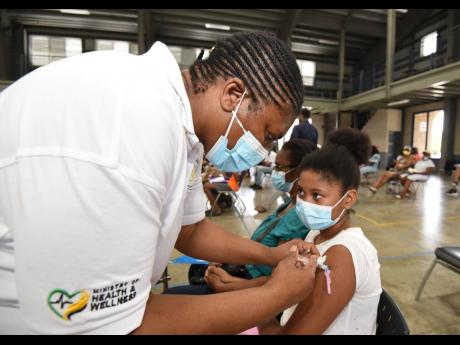Educators optimistic as Pfizer favourable for under-12s
News that the Pfizer-BioNTech COVID-19 vaccine has been found to induce a robust immune response in children between five and 11 years old in a clinical trial has triggered a weary sigh of relief among educators hopeful that this latest victory...
News that the Pfizer-BioNTech COVID-19 vaccine has been found to induce a robust immune response in children between five and 11 years old in a clinical trial has triggered a weary sigh of relief among educators hopeful that this latest victory could herald a nearing of the return to classrooms.
Pfizer Inc and BioNTech SE announced yesterday that their two-dose COVID-19 vaccine has been shown to induce an immune response in the children similar to that previously observed in the 16- to 25-year-olds, with a comparable safety profile to the older group, with temporary side effects of fever, sore arms and achiness experienced.
Last month, Jamaica began inoculating children 12 years and older.
The administration of Pfizer jabs has been suspended locally due to a shortage with Education Minister Fayval Williams saying last week that 73,880 students have been vaccinated. Of that number, some 22,000 students have received both doses of the vaccine.
The education ministry has also said that students would not be returning to the classroom until their school achieves a vaccination take-up of at least 65 per cent.
Schools were shuttered in March 2020 to contain the spread of the virus and have largely remained closed with secondary schools given the green light to open briefly to prepare students for regional examinations and a select few institutions for a face-to-face learning pilot programme late last year.
But with technological challenges bedevilling the sector as concerns about learning loss mount, the educators are hoping that this latest signal will bear fruit even as the manufacturers plan to ask for regulatory authorisation soon to use the shot in young children in the United States, Europe and elsewhere.
“It gives us hope that things are happening towards facilitating a smoother reopening of our schools for face-to-face classes,” Winston Smith, president of the Jamaica Teachers’ Association (JTA), told The Gleaner yesterday.
“Once the Ministry of Health gives its blessing, then we will abide by said blessing,” he added, with hopes that parents and students will be receptive to the jab and see vaccination as an opportunity to facilitate face-to-face interaction in a safe environment.
He maintained that vaccination is a personal choice and while it would be good to have all Jamaicans vaccinated against COVID-19, no one should be coerced into taking the jab.
Livern Wright, president of the Jamaica Association of Principals of Secondary Schools (JAPSS), expressed joy at the announcement of the success in the trial so far as he bemoaned that online learning has been “seriously limited in reach”.
“There’s work now to acquire the vaccines as early as possible, engage parents with the important information to help them decide, properly organise vaccination drives and get our children in a safe state for school,” Wright said.
The JAPSS president added that school administrators are willing to embrace every effort that will safely restore more reliable and consistent modes of instruction.
While noting that the health ministry is usually guided by the World Health Organization, which issues emergency use authorisation for COVID-19 vaccines, the president-elect of the Medical Association of Jamaica, Dr Leslie Meade, said that the ministry’s 65 per cent target would now be easier to reach.
“Our children should be able to go back to school because now our primary school age children will be able to be vaccinated against COVID-19, and the Ministry of Health and the Ministry of Education will be able to reach their goal of 65 per cent of school-age children being vaccinated,” he said.
He, however, acknowledged that it could also become more difficult to procure the vaccines as other countries will simultaneously target the vaccination of young children.
“The issue is whether or not the Jamaican Government will be able to secure adequate numbers of doses to cover the number of children that need to be vaccinated. They have to move very quickly to try and secure the necessary doses,” Meade stressed.
Israel, for example, has been combating a surge of cases in coronavirus infections due to the Delta variant by offering the Pfizer COVID-19 jab to children in the five to 11 age group early August. Children aged 12 and over had been eligible for the jab since June.
A recent survey by Jamaica’s education ministry found that only 59 per cent of parents were willing to have their children vaccinated.
Meade reasoned that continuous public education about the benefits of being vaccinated is necessary.

